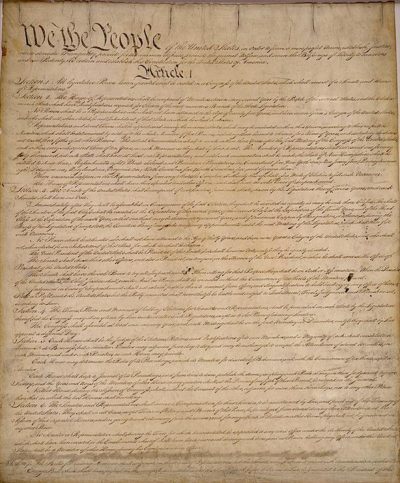From 49th Federalist
Here are a couple of samples from The Federalist Papers that may serve to raise your interest and encourage you to read them. My favorite Federalist writer was James Madison. The first selection is from 49th Federalist, in which Madison writes about the separation of powers. He explains why you have to have these checks and balances and why the Senate is important.
Madison says that in the constitution, you have these two bodies in the legislature, a bicameral legislature. And you have separation of powers between the legislative, executive and judicial branches of government. Then he says you’ve got the states. He’s made all of those separate arguments.
But he goes on saying that’s not enough because you have to give each of the branches the means and the interest to defend itself against the others. Madison feared the legislative branch would take over the executive branch. He thought that was the big problem. Today we may have the opposite problem. The executive branch, which is not really run by the president, at least not all of it, it is a huge thing today. It may actually take over the legislature, supplant it. It has already in many ways.
Madison expresses great trepidation about the course of things to come. He says one of the ways you will stop that is to give the branches powers to defend themselves. For example: Congress has the power of the budget over the executive branch. Congress has the power of advice and consent over treaties. Congress has the power to override a veto. Congress has the power to approve appointments, nominations by the president to serve in the executive offices.
The president has the means to defend himself. He can veto what the legislature passes. That gives him power, the equivalent of 1/6th of the votes in the legislature. Madison says these things are very important, fundamentally important.
You must have this deliberation. It is important to reach a settled conviction before you decide something. If you do not have that here is what he has to say: “The passions, therefore, not the reason, of the public, would sit in judgment. But it is the reason of the public alone, that ought to control and regulate the government. The passions ought to be controlled and regulated by the government.”
Aristotle wrote a book called Ethics. It isn’t true to say that Aristotle believes that the well ordered soul simply has reason in charge of the passions. What he really says is that if reason has charge of the passions, the passions can become trained. When they are trained, then every good choice is an interplay of thinking and desire. The whole soul comes together to produce it. It all starts with not letting the passions run away with itself. Madison proposes that solution to the body politic. The nation is to become like a well ordered soul.
From 51st Federalist
The second passage is from Federalist 51. It is about the same general theme. Madison is talking about how the branches get some of the power of the other branches to defend themselves. He says, “Ambition must be made to counteract ambition. The interests of the man must be connected with the constitutional rights of the place.” Lincoln repeated that phrase. “The interest of the man must be connected to the duty of the place.”
You put somebody in office, you give them a power and you must find a way to get them to use that power well. If you don’t they can be expected to act in their own self interest. That is human nature both in politics and outside it. Madison continues, “It may be a reflection on human nature that such devices should be necessary to control the abuses of government…. What is government itself but the reflections of human nature? If men were angels, no government would be necessary. If angels were to govern men, neither internal nor external control on the government would be necessary. ”
It is real, but also unfortunate that we need things like that. But that’s the human condition. That’s the order of nature. That is what human equality means. It does not mean we are all the same. We are all of us, each one, different. Everyone is different except in the respect that makes us human. You can always tell the difference between the similarity among humans.
The Federalist papers are about such things. They describe the greatest government, in terms of protecting the nature and rights of man, in the history of the world. They are the best single source of information about that government written by those who formed it.
